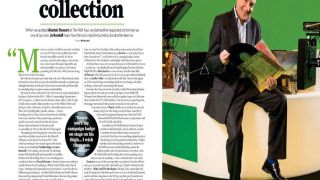“Music is crucial to my life because the work that we do at ITV News is incredibly important, but also incredibly stressful. It’s about accuracy, emotion and trying to turn stories into a form that will make it digestible and understandable to people so your brain is pounding all of the time. When I’m not doing that, how do I relax? It’s music.
My collection is made up of music that took a lot of financial and artistic investment. It was often an event. Now the kids wait until one minute past midnight then they download it. If you invest emotionally and financially in something it has an extra resonance and durability.
My mum is where it all starts for me. She was very musical and played the piano. Dad was in the RAF – Officer Commanding Operations at RAF Scampton – so Mum was the absolute classic officer’s wife. People would come round for dinner parties or go to the Officer’s Mess and she’d get on the old Joanna. A big RAF station like that is a town. There were bowling alleys, theatre, cinema… I was at boarding school so I’d go back and stay there for holidays.
I was very conscious of my mum being a performer, and she was such a music lover that she’d never dictate what you listened to but she would occasionally say, ‘Oh, not bloody Bob Dylan again’.
The tipping point in forging my own music taste was when my father was posted to the Maxwell, Alabama, as a lecturer for a year, in 1967. They ended up staying for two years longer and it meant I came across bands like Vanilla Fudge and Iron Butterfly. At boarding school in the UK, all things started with John Mayall, and in parallel, we had Jimi Hendrix and The Rolling Stones. For something more considered, there was Procol Harum.
A friend of mine very nearly got expelled from school for playing A Whiter Shade Of Pale on the church organ. Homburg and Conquistador are great tracks too. Gary Brooker is a brilliant singer and player – just like Keith Richards and David Gilmour these aren’t just jumped-up X Factor fabrications, these are the genuine, talented article, and there were a lot around back then.
The joy of America was hearing all this new stuff. I discovered bands from the film Easy Rider. There was also a big sampler industry, albums like The Rock Machine Turns You On on Columbia. Bands like Country Joe And The Fish and Jefferson Airplane would feature on albums like this. It was purely commercial, but you wanted to buy everything. It was very educational.
I also discovered The Doors. Jim was a poet, an Oscar Wilde figure, some of the stuff he wrote I just thought was sensational. The real test of it was simply being read without the music. The Alabama Song from their debut [The Doors] made me think, ‘Ooh, there’s something more there’.
Back home, when I went to Bristol University one of parents’ early gifts to me was Ziggy Stardust And The Spiders From Mars. I already had Hunky Dory and my mother probably didn’t approve that he was a transvestite, drug-swilling amour of Mick Jagger’s, but she knew my taste. Later on, I was Vice President of the student union and my friend Dave Satterthwaite, head of entertainment, got Bowie to come and perform there. It was about 73, and Bowie wore a campaign badge of mine, ‘Al Stewart For Vice President’, on his thigh. I wish there was a photo!
At Bristol there was a very strong folk music set. My friend Peter Green – not that one – would play the most beautiful guitar but then he’d have Ralph McTell or Bert Jansch to come and stay, and this other fella, Al Stewart. The folk scene got very close to prog type stuff and suddenly there was Jethro Tull, so we all joined in with that. That was the hippie era, if we weren’t being womanising devils we were being cool dudes stroking our hair and communing with nature.
I was into the Stones from the off, and even liked Their Satanic Majesties Request, which obviously was a stab at Sgt Pepper. It’s probably Bill Wyman’s best album with some really fun, quirky songs on it. I first saw them in Bristol in 1972. I felt terribly cool in my Stones-esque floppy hat, then Jagger turned up in his cap and tour jacket. It was a new era. I was a latecomer to Floyd, and like an ex-smoker I became the dinner party bore who bangs on about them. A Saucerful Of Secrets and Ummagumma bypassed me. Dark Side Of The Moon and Wish You Were Here became so important. And I loved The Wall, and still do. I wouldn’t say The Wall is harsh. It’s about Roger’s problems with his family, school, with war, societal constraint, freedom, liberty, these are issues for everybody. But there was something uniquely potent about Roger as a bass guitarist writing these complex melodies and soul-searching melodies.
I understood The Wall from start to finish. My father was in the military, public school, brutal teachers, been there, done all of that stuff and the feeling that society is getting at you and you can’t do anything – I was a student leader, I was a lefty. Genesis was one of those groups that one aspired to be a fan off but I never got across the barricade. I just didn’t get it. Maybe Gabriel was the problem – Mike And The Mechanics, though, I love, particularly the track The Living Years.
My father and I were very close, but he had dementia and it took him a long time to die. We’d go up there pretty much every weekend but I wasn’t there for his demise. It doesn’t bother me as I was there all the time during ‘the living years’. Whether it’s rock stars, or arses like me, you think you’re so great but you’re nothing without your parents. Mike Rutherford realised that, and I’m heartbroken for him.
I can’t believe I’ve not mentioned my wife yet. Well, our music tastes differ but we do agree on Phil Collins. Most of your readers would say Collins’ solo stuff is tedious, stomach-churning pap but I would argue that I have a catholic taste in music. Sometimes Phil is just right – and Sinatra, and Bryan Ferry, who I think is so classy and elegant. Music is a big book and it’s all valid. You need to give it a chance. If I never listen to a piece by Stockhausen again I wouldn’t miss it. But if I hadn’t listened to it at all I would have missed something.”
- Meet the best turntables for your record collection
- Smaller budget? No problem! These are the best budget turntables


